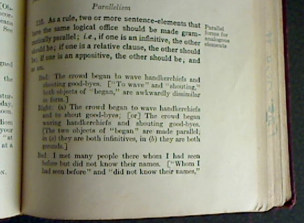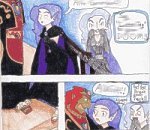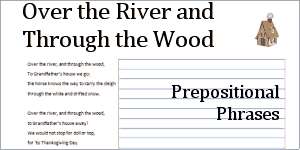Parallelism in Writing
August 24, 2003: When I tested my son with an ACT practice test, I noticed that he had trouble detecting faulty parallelism in sentences. That meant he needed to review parallel structures.
Examples of Parallelism Instead of Lengthy Explanations
The Beatitudes are an example of parallelism in a group of sentences.
Blessed are ....... for they .......
(Matthew 5)
Common Parallelism Errors
To sing, to laugh, and dancing will enrich your day. Wrong
Wrong
To sing, laugh, and to dance will enrich your day. Wrong
Wrong
To sing, to laugh, and to dance will enrich your day. Good (all infinitives)
Good (all infinitives)
Singing, laughing, and dancing will enrich your day. Good (all gerunds)
Good (all gerunds)
She wants health, wealth, and to be happy. Wrong
Wrong
She wants to be healthy, wealthy, and happy. Okay
Okay
She wants health, wealth, and happiness. Better
Better
the books, papers, and the pencils Wrong
Wrong
the books, the papers, and the pencils Good
Good
books, papers, and pencils Good
Good
My friend is faithful and helps me. Wrong
Wrong
My friend is faithful and helpful. Corrected
Corrected
She is friendly, smart and a good neighbor. Wrong
Wrong
She is friendly, smart, and neighborly. Corrected
Corrected
Shifting Tense
Below is something that your child has probably studied although it was not called parallelism; it was referred to as "Keeping the same tense throughout the sentence/paragraph." (shifting tense).
Tense shifts:
The dog chased squirrels while the cat stalks birds. Wrong
Wrong
The dog chased squirrels while the cat stalked birds. Corrected
Corrected
She had made pudding for breakfast and has made ice cream for lunch.  Wrong, had made and has made are of different tense.
Wrong, had made and has made are of different tense.
She has made pudding for breakfast and has made ice cream for lunch.  Corrected
Corrected

Image of my copy of College Handbook of Composition, revised edition 1931, page 93
Examples from College Handbook of Composition
by Edwin C. Wooley, PH.D. & Franklin W. Scott, PH.D.
revised edition 1931
Parallelism
115. As a rule, two or more sentence-elements that have the same logical office should be made grammatically parallel; i.e., if one is an infinitive, the other should be; if one is a relative clause, the other should be; if one is an appositive, the other should be; and so on.
Bad: The crowd began to wave handkerchiefs and shouting good-byes.
["To wave" and "shouting," both objects of "began," are awkwardly dissimilar in form.]
Right: (a) The crowd began to wave handkerchiefs and to shout good-byes.
[or]
(b) The crowd began waving handkerchiefs and shouting good-byes.
[The two objects of " began " are made parallel; in (a) they are both infinitives, in (b) they are both gerunds.]
Bad: I met many people there whom I had seen before but did not know their names.
["Whom I had seen before" and "did not know their names," both qualifiers (logically) of "people," are awkwardly dissimilar in form.]
Right: I met many people there whom I had seen before but whose names I did not know.
[The two qualifiers of "people" are made parallel; both are relative clauses.]
Bad: I delight in a good novel—one which portrays strong characters and in reading the book you are thrilled.
[The two qualifiers of "one" are awkwardly dissimilar; the first ("which portrays strong characters") is a relative clause, the second ("in reading the book you are thrilled") a sentence.]
Right: I delight in a good novel—one which portrays strong characters and which thrills the reader.
[The two qualifiers are made parallel; both are relative clauses.]
Bad: Two courses are open to us: first, to have the missionary society transfer to us a missionary now in the field; second, one of our own members has volunteered to go, and we may send him.
[The two logical appositives to "two courses" are awkwardly dissimilar; the first ("to have . . . field") is a grammatical appositive, the second ("one of our own members . . . him") a sentence.]
Right: Two courses are open to us: first, to have the missionary society transfer to us a missionary now in the field; second, to send one of our own members, who has volunteered to go.
[The two logical appositives are made parallel; both are grammatical appositives to "courses."]
[or]
Two courses are open to us. First, we may have the missionary society transfer to us a missionary now in the field; second, we may send one of our members, who has volunteered to go.
[The two logical appositives are made parallel; both are sentences. ]
Bad: I have lived in many states, some for only a short time, while in others I have lived a year or more.
[The two qualifiers of the main clause are awkwardly dissimilar; the first ("some for only a short time") is an incomplete modifier of "lived," the second ("while . . . more") a complete subordinate clause.]
Right: I have lived in many states,—in some for only a short time, in others for a year or more.
[The two qualifiers of the main clause are made parallel; both are prepositional phrases modifying "lived."]
Bad: I was asked to contribute to the church, Christian Association, and to the athletic fund.
[The three modifiers of "contribute" are awkwardly dissimilar in form; the first is a complete phrase, the second a noun with both the preposition and the article lacking, the third a complete phrase.]
Right: I was asked to contribute to the church, to the Christian Association, and to the athletic fund.
[The three modifiers of "contribute" are made parallel in form; each is a complete phrase. ]
[or]
I was asked to contribute to the church, the Christian Association, and the athletic fund.
["To" is made to govern three objects parallel in form,—each consisting of "the" and a noun.]
Free Online Reference
Linked below is a web page that tells precisely what parallelism is: http://grammar.ccc.commnet.edu/grammar/parallelism.htm
The web page that is linked above defines parallelism and has examples as well as quizzes.
Donna Young
September 25, 2007
Hello Visitor!
I am currently working on this website to add to its ginormousness. Thank you for visiting, and please subscribe yearly to access my many printable files! Donna Young
May 13, 2021

 Unit Multipliers
Unit Multipliers Comic Strip Templates
Comic Strip Templates While working on the page, Prepositional Phrases, I added files for the Thanksgiving song by Lydia Maria Child: Over the River and Through the Wood. The PDF version has a ruled right side for anything that you deem useful.
While working on the page, Prepositional Phrases, I added files for the Thanksgiving song by Lydia Maria Child: Over the River and Through the Wood. The PDF version has a ruled right side for anything that you deem useful.


